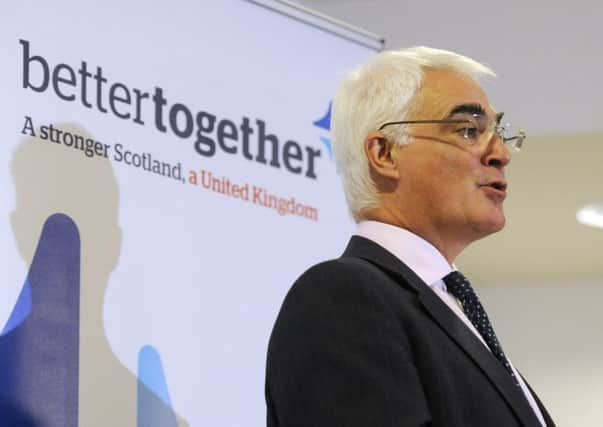Matt Qvortrup: Better Together must back Darling


IT IS almost trite to note that briefings and whispering campaigns are part and parcel of politics. And now it seems that they are at it again. Murmurings of dissatisfaction with Alistair Darling have surfaced in recent days and it was suggested Better Together had effectively sidelined him, and that his role was to be taken over by Douglas Alexander. This of course, has been swiftly denied by Better Together, but only after the damage has been done.
While briefing against colleagues is a much-favoured pastime among the political classes, it is an activity Better Together can ill afford at the moment. One can understand their frustration. It is widely acknowledged – and the polls support the view – that Darling has failed to land a knock-out blow and that a consistent 20 per cent lead has dwindled under his watch.
Advertisement
Hide AdAdvertisement
Hide AdAdapting the message to the prevailing psephological winds is, of course, sensible. There are different phases in a referendum campaign in the same way as there are different stages in an electoral contest. The problem is the impression that the whispering campaign has left. As examples from other countries show, the consequences of the back-stabbing and similar tactics send the wrong signal to the electors.
An example from overseas may be helpful. In Denmark in 2000, when our eastern neighbours voted on whether to join the euro, the Labour government appointed Henrik Kristensen as leader of its campaign. The former postman was tasked with conveying the message that failure to vote for the euro would lead to economic disaster. The Danish voters were not impressed. A solid lead for the government turned into a narrow one. After a whispering campaign, Kristensen was heavily briefed against. The government found it difficult to explain what had happened and wasted valuable time responding to irrelevant questions. While still ahead in the polls, the briefings and counter-briefings gave the impression of a campaign in disarray. They lost the referendum by a margin of 6 per cent.
Of course, the vote on independence cannot directly be compared to the Danish vote on the euro. All referendums are different, take place within different contexts, and have a unique dynamic shaped by individual men and women.
But all the differences notwithstanding, there is a pattern across different referendums. One such constant is that perceptions are real. “Esse est percipi” wrote the Irish philosopher George Berkeley (1685-1753); roughly “What is, is what is perceived.” And without delving into the finer points of classical empiricism, this abstract phrase is pertinent to practical politics. The “perception” – whether accurate or not – is that some people in Better Together have felt a need to brief against their leader and spokesperson. All this does not help the campaign and it immediately begs the questions: what is wrong with Darling and why the briefings against him?
If there is a problem with a campaign, if the polls do not show steady progress, the best way is to address the problem squarely; to admit that there is a problem and that the previous campaign has been somewhat lacklustre. This is what happened in Quebec when the Yes campaign replaced the hapless Jacques Parizeau with the charismatic Lucien Bouchard. The latter turned a looming catastrophic defeat into an almost victory.
But rather than following the example of the Parti Québécois, Better Together seems bent on following the doomed strategy of the Danish Labour Party in 2000. The risk of the briefings is that the voters focus on the internal struggle within Better Together. Further, the grassroots campaigners will waste valuable time explaining that Darling is still in charge when asked questions on the doorstep. This will only benefit Yes Scotland, who have the opportunity to present their case to the voters almost unopposed.
It is too early to say who will win the referendum in September. Better Together may still win the referendum, but they are almost certain to lose the campaign.
• Matt Qvortrup is author of Referendums And Ethnic Conflict published by Pennsylvania Press